Find current national learning reports and, where applicable, RCOG responses to recommendations.
Governmental reports
Maternity Services in England
House of Commons Health and Social Care Committee
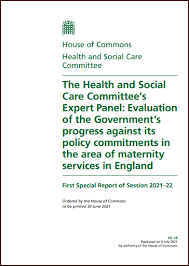 The House of Commons Health and Social Care Committee published a report on the The safety of Maternity Services in England 2021-22. This report although acknowledges that the NHS offers some of the safest maternity care in the world, also describes a system where there is worrying variation in the quality of maternity care, as well as evidence of a poor safety culture in some units. The Committee’s inquiry examined evidence relating to the safety of maternity services. It builds upon current investigations following incidents at East Kent Hospitals University Trust and Shrewsbury and Telford Hospitals NHS Trust, as well as the inquiry into the University Hospitals of Morecambe Bay NHS Trust. The inquiry also considered whether the clinical negligence and litigation processes need to be changed to improve the safety of maternity services and explored the impact of blame culture on learning from incidents.
The House of Commons Health and Social Care Committee published a report on the The safety of Maternity Services in England 2021-22. This report although acknowledges that the NHS offers some of the safest maternity care in the world, also describes a system where there is worrying variation in the quality of maternity care, as well as evidence of a poor safety culture in some units. The Committee’s inquiry examined evidence relating to the safety of maternity services. It builds upon current investigations following incidents at East Kent Hospitals University Trust and Shrewsbury and Telford Hospitals NHS Trust, as well as the inquiry into the University Hospitals of Morecambe Bay NHS Trust. The inquiry also considered whether the clinical negligence and litigation processes need to be changed to improve the safety of maternity services and explored the impact of blame culture on learning from incidents.
- View the HoC Health & Social Care Committee report
- View the College's joint response to the report with the Royal College of Midwives
Judiciary reports
The Montgomery Ruling
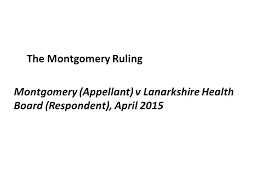 The case of Nadine Montgomery from 1999 who was pregnant with her first child. Nadine had type 1 diabetes and was concerned that the size of her baby may lead to a difficult vaginal birth. On expressing her concerns, they were ignored and a plan was made for her to have a vaginal delivery. During the delivery, her baby’s shoulder got stuck (shoulder dystocia) which resulted in a delay between the delivery of his head and shoulders. The resulting delay caused significant hypoxic injury resulting in brain damage and cerebral play. The case was made that as the consultant had not discussed the risk of shoulder dystocia, the potential significant consequences of it occurring and the alternative option of a caesarean birth that negligence had occurred as far as consent is considered; Mrs Montgomery was not able to make a fully informed decision without full information on all the options. The consultant stated that the risk of shoulder dystocia occurring in a woman with diabetes was 10% but that the risk of a serious consequence from shoulder dystocia was 0.2% for a brachial plexus injury and less than 0.1% for hypoxic injury. As the risk of serious consequence was felt to be so small, it was not discussed.
The case of Nadine Montgomery from 1999 who was pregnant with her first child. Nadine had type 1 diabetes and was concerned that the size of her baby may lead to a difficult vaginal birth. On expressing her concerns, they were ignored and a plan was made for her to have a vaginal delivery. During the delivery, her baby’s shoulder got stuck (shoulder dystocia) which resulted in a delay between the delivery of his head and shoulders. The resulting delay caused significant hypoxic injury resulting in brain damage and cerebral play. The case was made that as the consultant had not discussed the risk of shoulder dystocia, the potential significant consequences of it occurring and the alternative option of a caesarean birth that negligence had occurred as far as consent is considered; Mrs Montgomery was not able to make a fully informed decision without full information on all the options. The consultant stated that the risk of shoulder dystocia occurring in a woman with diabetes was 10% but that the risk of a serious consequence from shoulder dystocia was 0.2% for a brachial plexus injury and less than 0.1% for hypoxic injury. As the risk of serious consequence was felt to be so small, it was not discussed.
This case was heard at the UK Supreme Court in July 2014 before seven Justices following failed appeals in the Court of Session and the Inner House. The involvement of seven justices in this final appeal is of particular importance as this is the number of justices required to change or overrule a previous House of Lords ruling; in this case, the ruling in Sidaway.
The argument in this appeal was that is not appropriate to use the accepted practice of a body of reasonable medical practitioners when consent is considered. It should be viewed differently from the process of diagnosis or treatment. The relevant guidance from the GMC was reviewed and this supported the argument that it was the doctor’s role to provide a patient with all the information to allow them to make a balanced judgement between different options. (Ref www.rcpsg.ac.uk)
- You can find more information on consent guidance for the O&G profession and you can find RCOG’s document Clinical Governance Advice No. 6: Obtaining valid consent.
Arms Lengths Body Reports
Independent Medicines and Medical Devices Safety Review
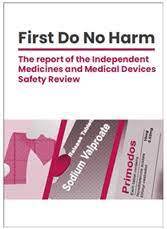 The report of the Independent Medicines and Medical Devices Safety Review was announced in the House of Commons on 21 February 2018 by Jeremy Hunt, the then Secretary of State for Health and Social Care. Its purpose was to examine how the healthcare system in England responds to reports about harmful side effects from medicines and medical devices and to consider how to respond to them more quickly and effectively in the future. The Review was asked to investigate what had happened in respect of two medications and one medical device:
The report of the Independent Medicines and Medical Devices Safety Review was announced in the House of Commons on 21 February 2018 by Jeremy Hunt, the then Secretary of State for Health and Social Care. Its purpose was to examine how the healthcare system in England responds to reports about harmful side effects from medicines and medical devices and to consider how to respond to them more quickly and effectively in the future. The Review was asked to investigate what had happened in respect of two medications and one medical device:- hormone pregnancy tests (HPTs) – tests, such as Primodos, which were withdrawn from the market in the late 1970s and which are thought to be associated with birth defects and miscarriages;
- sodium valproate – an effective anti-epileptic drug which causes physical malformations, autism and developmental delay in many children when it is taken by their mothers during pregnancy; and
- pelvic mesh implants – used in the surgical repair of pelvic organ prolapse and to manage stress urinary incontinence. Its use has been linked to crippling, life- changing, complications; and to make recommendations for the future.
- Download the report (PDF)
- See the joint response (PDF) with the British Society of Urogynaecology.
CQC
The CQC’s report State of Health Care and Adult Social Care in England provides a comprehensive picture of the system, and the experiences of staff and patients.
- Review the report
- See the RCOG’s response to the report.
The CQC’s ‘Safety, Equity and Engagement in Maternity Services’ presents an analysis of the key issues persisting in some maternity services and highlights where action is still needed to support vital improvements.
- Review the CQC report
- See the RCOG's response to the report
CQC’s briefing Getting safer faster: key areas for improvement in maternity services highlighted continued concerns about the variation in quality and safety of maternity services across the country.
Despite the greater national focus on maternity in recent years and the welcome improvements it has led to, the pace of progress has been too slow and action to ensure all women have access to safe, effective, and truly personalised maternity care has not been sufficiently prioritised to mitigate risk and help prevent future tragedies from occurring.
Following the publication of ‘Getting safer faster’ the CQC launched a programme of risk-based, focused maternity safety inspections involving a more focused in-depth assessment of relational elements such as team working and culture, staff and patient experience.
Summary of Themes arising from the Healthcare Safety Investigation Branch Maternity Programme
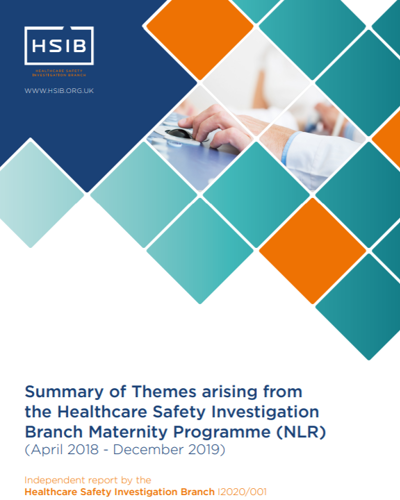 This national learning report highlights the themes emerging from the initial investigations carried out as part of HSIB maternity investigation programme. It looks at maternity investigations carried out by HSIB between April 2018 and December 2019. The national learning reports offer insight and learning about recurrent patient safety risks in NHS healthcare that have been identified through HSIB investigations. The reports present a digest of relevant, previously investigated events, highlight recurring themes and, where appropriate, make safety recommendations.
This national learning report highlights the themes emerging from the initial investigations carried out as part of HSIB maternity investigation programme. It looks at maternity investigations carried out by HSIB between April 2018 and December 2019. The national learning reports offer insight and learning about recurrent patient safety risks in NHS healthcare that have been identified through HSIB investigations. The reports present a digest of relevant, previously investigated events, highlight recurring themes and, where appropriate, make safety recommendations.
Reports from organisations/charities
MBRRACE Report
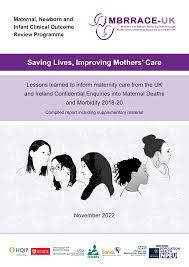 'MBRRACE-UK' is the collaboration appointed by the Healthcare Quality Improvement Partnership (HQIP) to run the national Maternal, Newborn and Infant clinical Outcome Review Programme (MNI-CORP) which continues the national programme of work conducting surveillance and investigating the causes of maternal deaths, stillbirths and infant deaths.
'MBRRACE-UK' is the collaboration appointed by the Healthcare Quality Improvement Partnership (HQIP) to run the national Maternal, Newborn and Infant clinical Outcome Review Programme (MNI-CORP) which continues the national programme of work conducting surveillance and investigating the causes of maternal deaths, stillbirths and infant deaths.
- Download the report Saving Lives, Improving Mothers' Care 2021 – Lessons learned to inform maternity care from the UK and Ireland Confidential Enquiries into Maternal Deaths and Morbidity 2017-19 (PDF)
- See the College's response to the report
- Download the report Saving Lives, Improving Mothers Care 2022 – which looks into the care of women who died during or up to one year after pregnancy between 2018 and 2020 in the UK (PDF). This is the first report to include data that demonstrates the impact of the COVID-19 pandemic on maternal deaths.
- See the College's response to the report
- Download the report MBRRACE-UK Saving Lives Improving Mothers' Care - Lessons learned to inform maternity care from the UK and Ireland Confidential Enquiries into Maternal Deaths and Morbidity 2019-21
- See the Colleges response to the report
- Download the report MBRRACE-UK Perinatal Mortality Surveillance - UK perinatal deaths for births from 1 January 2021 to 31 December 2021MBRRACE-UK Perinatal Mortality Surveillance- UK perinatal deaths for births from 1 January 2021 to 31 December 2021
- See the College's response to the report
- Download the report MBRRACE-UK Perinatal Confidential Enquiry: comparison of the care of Asian and White women who have experienced a stillbirth or neonatal death updated 11 January 2024
- Download the report MBRRACE-UK Perinatal Confidential Enquiry: A comparison of the care of Black and White women who have experienced a stillbirth or neonatal death updated 11 January 2024.
- See the College's response to these reports
- Download the report MBRRACE-UK Perinatal Confidential Enquiry: Maternal mortality 2020-2022
- See the College's response to these reports
Public inquiries
Reading the signals: Maternity and neonatal services in East Kent 2022
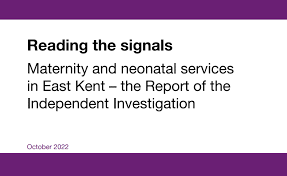 The report of the independent investigation led by Dr Bill Kirkup on Maternity and Neonatal Services in East Kent. The key points from this report details that between 2009 and 2020 at the two hospital sites, The Queen Mother Hospital in Margate and the William Harvey Hospital in Ashford, the Trust provided clinical care that was “suboptimal” and led to significant harm. The report shows that, during this period, there were multiple missed opportunities that should have led to problems being acknowledged and tackled effectively. If care had been given to the nationally recognised standards, the outcome could have been different in nearly half of the 202 cases assessed by the Investigation’s panel. The outcome could have been different in 45 of the 65 baby deaths – more than two-thirds of cases. The report acknowledges that it includes “minimum estimates” of the frequency of harm, with the panel having only worked with families who volunteered to be involved in the report. Alarmingly, the panel has “not been able to detect any discernible improvement in outcomes or suboptimal care” in the decade between 2009 and 2020.
The report of the independent investigation led by Dr Bill Kirkup on Maternity and Neonatal Services in East Kent. The key points from this report details that between 2009 and 2020 at the two hospital sites, The Queen Mother Hospital in Margate and the William Harvey Hospital in Ashford, the Trust provided clinical care that was “suboptimal” and led to significant harm. The report shows that, during this period, there were multiple missed opportunities that should have led to problems being acknowledged and tackled effectively. If care had been given to the nationally recognised standards, the outcome could have been different in nearly half of the 202 cases assessed by the Investigation’s panel. The outcome could have been different in 45 of the 65 baby deaths – more than two-thirds of cases. The report acknowledges that it includes “minimum estimates” of the frequency of harm, with the panel having only worked with families who volunteered to be involved in the report. Alarmingly, the panel has “not been able to detect any discernible improvement in outcomes or suboptimal care” in the decade between 2009 and 2020.
- Download the report (PDF).
- View the College’s response to the report
- Please see the RCOG’s statement to the Governments full response to the review.
Ockenden Report
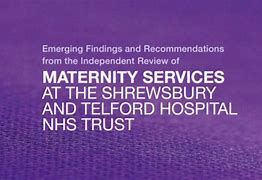 Donna Ockenden led the review of Maternity services at Shrewsbury and Telford. It reports the tragic findings from 1,592 real clinical incidents of harm at The Shrewsbury and Telford Hospital NHS Trust (SaTH) between 2000-2019. The clinical incidents include stillbirths, neonatal deaths, maternal deaths, and cases of hypoxic ischaemic encephalopathy (HIE; a brain injury caused by a lack of oxygen or blood flow during labour). The report demonstrates a need for support and investment in SaTH and also in wider maternity services.
Donna Ockenden led the review of Maternity services at Shrewsbury and Telford. It reports the tragic findings from 1,592 real clinical incidents of harm at The Shrewsbury and Telford Hospital NHS Trust (SaTH) between 2000-2019. The clinical incidents include stillbirths, neonatal deaths, maternal deaths, and cases of hypoxic ischaemic encephalopathy (HIE; a brain injury caused by a lack of oxygen or blood flow during labour). The report demonstrates a need for support and investment in SaTH and also in wider maternity services.
- Download the Ockenden Report (PDF)
- The RCOG have begun to undertake a gap analysis of the recommendations. View the College's response to the Ockenden Report
- Read about further work the College is undertaking through the Independent Maternity Working Group (IMWG)
- Learn more about the IMWG.
